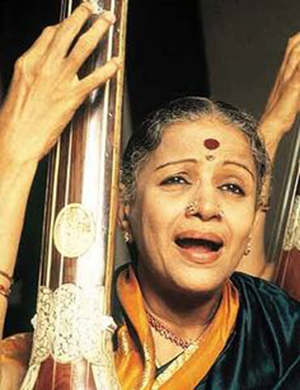New Delhi, Sep 18: As a child, 'Kunjamma', as M S Subbulakshmi was fondly called, learnt to play veena from her mother and sang in the temples of Madurai but little did she know that one day she would be known as 'the Queen of Carnatic music'.
In her book, "Kunjamma-Ode to a Nightingale", renowned Bharatanatyam dancer and choreographer, Lakshmi Vishwanathan captures some of the interesting moments from Subbulakshmi's glorious life to celebrate her birth centenary on September 16.
Vishwanathan, who knew the singer closely, says Subbulakshmi's mastery of classical ragas combined with her unforgettable screen performances made her a rare genius.
"I believe when she sang the angels in heaven seemed to dance, for such was her melodious voice," says the author while comparing Subbulakshmi to iconic opera singer, Maria Callas.
The 130-page book, published by Roli Books, speaks volumes of Subbulakshmi's journey from a little girl who loved singing to the heights of musical glory.
"Although she felt she was interpreting music, her audience felt she was creating it. Herein lay her genius. Many great artists had left their imprint on various songs.
"Subbulakshmi's uniqueness, however, lay in making the audience remember only the way in which she sang these songs," writes the author in her book.
Subbulakshmi wanted to make a name of her own in music since her childhood. She practiced everyday for long hours, strictly abiding by the rules of Carnatic music.
"... she began singing at temples and marriages but her recitals were so impressive that her reputation began to grow. The Gramophone Company of India invited her regularly to Madras to record albums," says the artist.
The singer's recording of Tyagaraja's song 'Evarimata' in Raga 'Kambodhi' became a hit with record sales and earned her the title Evarimata M S Subbulakshmi. The big break in Subbulakshmi's life came after she was invited to sing in Bombay as part of a festival.
She had to almost cancel the event since the violinist who was to accompany her declined at the last minute. But Subbulakshmi's destiny seemed to be in the city.
"The concert was re-scheduled and since all other artists left for Bombay someone would be required to escort her. A young man who loved music volunteered in spite of having a severe toothache at that time. He was a go-getter who would be useful in Bombay. He was tall and handsome T Sadasivam."
Smitten by her voice, Sadasivam decided to marry her. "The only way he could devote all his energy to this task was by marrying her. In a simple and a private ceremony they were married at the temple of Thiruneermalai, an ancient hill shrine on the outskirts of Madras," writes the author.
Sadasivam didn't want Subbulaskhmi's music to be restrained to concerts and recordings. He had the dream of taking it to the common man. And nothing could be better than the cinema.
Subbulakshmi acted in film 'Meera' at the behest of her husband and became the incarnation of the people's vision overnight.
"He was of the opinion that if Subbulakshmi wants to act in a film it could not be a mere entertainer. It would need to carry a universal message for the masses. After much deliberations she chose herself the story of Meera," Vishwanathan writes.
The fifties and sixties which marked the peak of Subbulakshmi's career and status made her the ultimate diva of Carnatic music. Subbulakshmi learnt bhajans and devotional songs from a host of masters like Dilip Kumar Roy and Srinivasan Rao Vyas.
The book speaks specifically of her immortal bhajans, sung in virtually every Indian language with singular devotion.
"Her immortal bhajans and her devotion won a place for herself in the hearts of the people- the final destination that fate had ordained for her," reads the book.





Comments
Add new comment